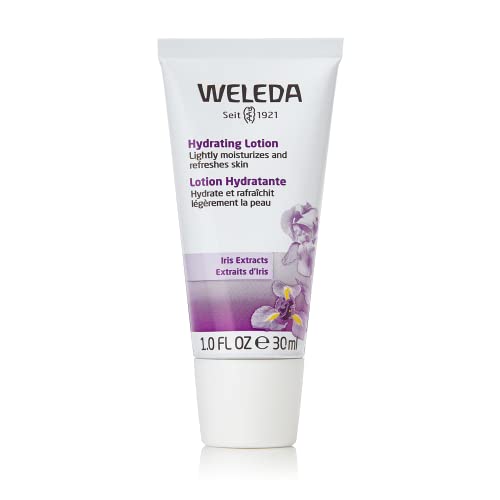
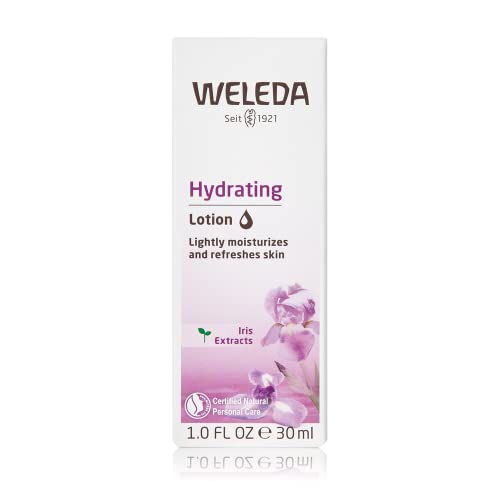
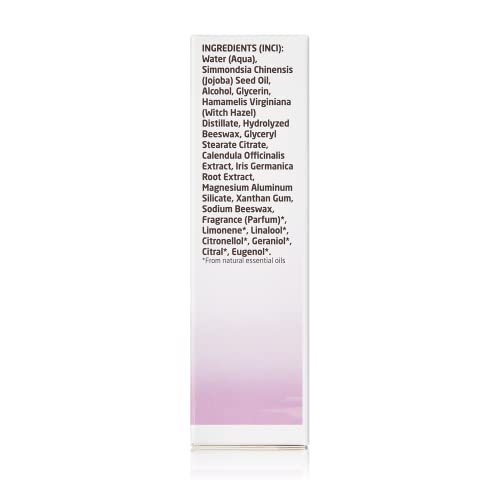
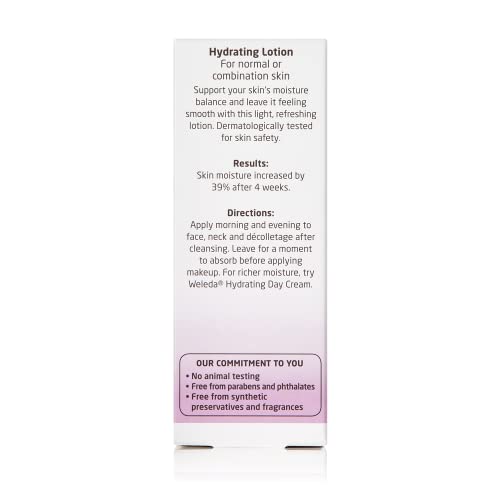
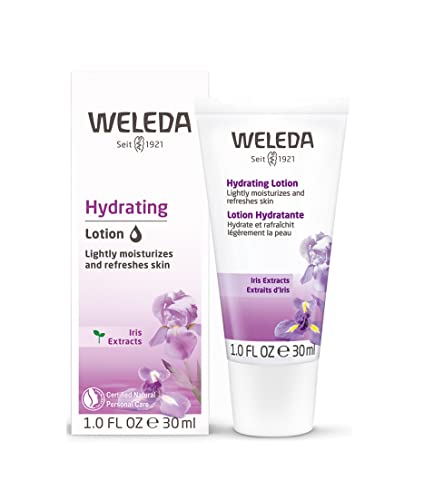
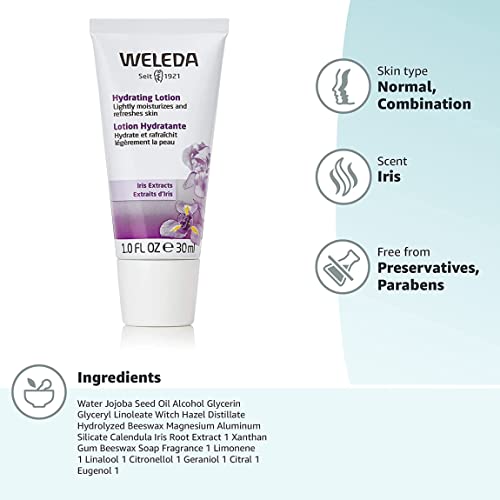
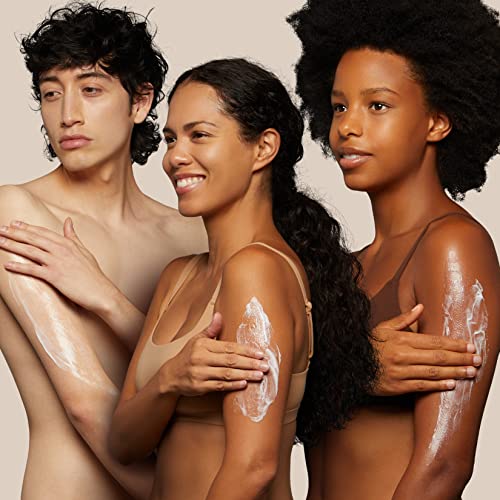

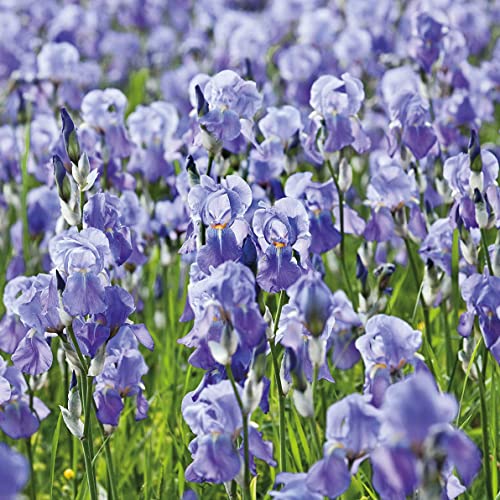
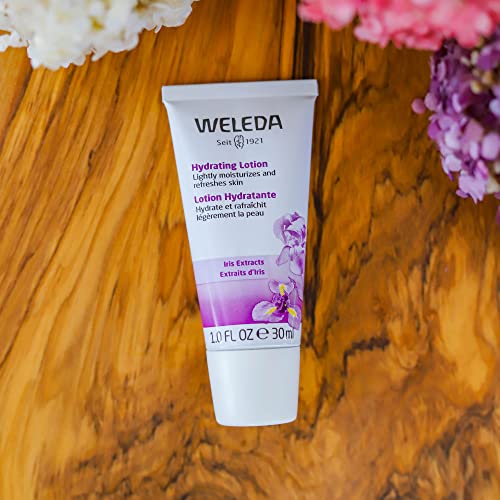
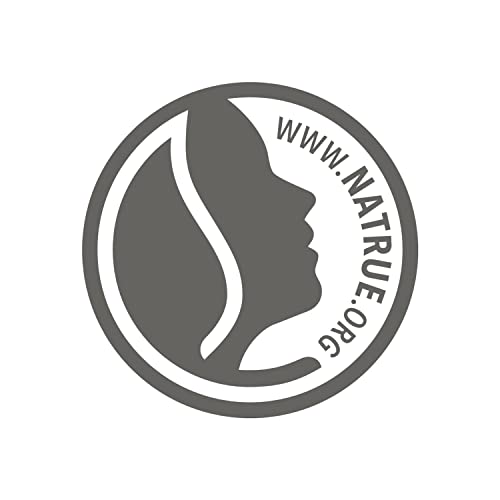

Weleda Hydrating Facial Lotion - Balances Oily Skin, Plant-Powered with Iris & Jojoba - 1oz


Linalool
High RiskLinalool is a terpene commonly found in various plants, particularly in lavender and mint. It is primarily used in products for its fragrance and potential antimicrobial properties. Linalool is also utilized in formulations for its ability to enhance the sensory experience of personal care and household products.
Sustai Insights
Linalool offers functional benefits as a naturally occurring fragrance component and may exhibit antimicrobial properties. However, it presents high allergenic potential, with concerns about skin irritation and sensitization. Environmental risks include contamination issues, though it is not classified as a persistent pollutant. Regulatory bodies have noted the need for careful handling due to its allergenic nature. Overall, despite some beneficial attributes, the ingredient carries a high risk profile, warranting cautious use and consideration of safer alternatives.
Geraniol
High RiskGeraniol is a naturally occurring scent ingredient commonly found in essential oils from plants such as geraniums and lemongrass. It is primarily used for its pleasant floral aroma in perfumes, cosmetics, and household products.
Sustai Insights
Geraniol serves as a fragrance component and offers a natural option for scenting products. However, it has a high allergenic potential and may cause skin irritation in sensitive individuals. While it is considered low risk for carcinogenicity and reproductive toxicity, regulatory bodies have placed restrictions on its use due to allergenic concerns. Overall, the assessment reflects a high-risk level, particularly for those prone to allergies, highlighting the need for caution in its application.
Citronellol
High RiskCitronellol is a naturally occurring scent ingredient commonly found in various essential oils. It is primarily used for its aromatic properties in perfumes, cosmetics, and household products, contributing to fragrance profiles.
Sustai Insights
Citronellol serves as a fragrance component, enhancing product appeal. However, it has a high allergenic potential, posing risks of skin irritation and sensitization. Environmental concerns include contamination risks. Regulatory bodies have restrictions on its use, emphasizing caution. Overall, citronellol presents a high risk regarding health and safety, warranting careful consideration in product formulations.
Eugenol
High RiskEugenol is a naturally occurring scent chemical found in various plants, particularly clove oil, and is commonly used in fragrances, flavorings, and as a potential antimicrobial agent in personal care products. It is recognized for its aromatic properties and is utilized for its ability to mask undesirable odors.
Sustai Insights
Eugenol offers functional benefits as a fragrance and has potential antimicrobial properties, being biodegradable and derived from renewable sources. However, it poses high allergenic potential, irritation risks, and may affect sensitive individuals. Regulatory bodies have noted usage restrictions due to its health risks. Overall, eugenol is assessed to have a high risk level, making careful usage and consideration of alternatives advisable.
Geranial
Medium RiskGeranial is a naturally occurring compound found in essential oils, primarily derived from lemongrass. It is commonly used in fragrances and flavoring due to its lemon-like scent. Geranial acts as a fragrance component and is often included in personal care and cosmetic products.
Sustai Insights
Geranial offers functional benefits as a fragrance enhancer in various products. While it is generally well-tolerated, it has a moderate allergenic potential, and caution is advised for sensitive individuals. Environmentally, it does not appear to be bioaccumulative, but its use is restricted in some verified products. Overall, the risk level is assessed as medium, suggesting that while it is useful, careful consideration of exposure is warranted.
Glyceryl Linoleate
Medium RiskGlyceryl linoleate is a monoester of glycerin and linoleic acid. It acts as an emulsifier and skin conditioning agent, commonly used in cosmetic and personal care products to enhance texture and stability.
Sustai Insights
Glyceryl linoleate provides functional benefits as an emulsifier and skin conditioner, contributing to product stability and user experience. It is generally regarded as low risk for health concerns, including carcinogenicity and allergenic potential. However, there are moderate use restrictions and some irritation potential. Environmentally, it poses low risks, as it is not considered a pollutant or bioaccumulative. Regulatory bodies do not list it as hazardous, but users should still practice safe usage. While alternatives exist, glyceryl linoleate remains a viable option for formulation needs, leading to an overall medium risk assessment.
Limonene
Medium RiskLimonene is a scent ingredient and solvent naturally found in citrus fruits, commonly used in personal care and cleaning products for its fragrant properties. It serves as a flavoring agent and enhances the overall sensory experience of products.
Sustai Insights
Limonene offers functional benefits such as acting as a solvent and fragrance enhancer. However, it carries a high allergenic potential, which can trigger skin or respiratory sensitivities in some individuals. Environmental concerns include moderate persistence and bioaccumulation, along with potential ecotoxicity. Regulatory restrictions necessitate verification in products containing this ingredient. Overall, the risk level is assessed as medium, emphasizing the importance of cautious use, particularly for sensitive populations. Safer alternatives may be considered to mitigate these risks.
Xanthan Gum
Low RiskXanthan gum is a polysaccharide, a sugar-based compound produced by the fermentation of glucose or sucrose. It is commonly used as a thickening agent and stabilizer in various food and cosmetic products due to its ability to improve texture and prevent ingredient separation.
Sustai Insights
Xanthan gum serves effectively as a thickener and stabilizer, enhancing product texture and consistency. It is biodegradable and typically derived from renewable sources, supporting sustainability efforts. Health risks are minimal, with low concerns regarding carcinogenicity, allergies, and reproductive toxicity. Environmental impact is similarly low, posing no significant hazards. Regulatory agencies, including the FDA, regard it as safe for use, with no significant restrictions. Overall, xanthan gum is assessed as low risk, making it a suitable ingredient in formulations.
Beeswax, Yellow
Low RiskBeeswax, yellow, is a natural wax produced by honeybees, primarily composed of esters of fatty acids and long-chain alcohols. It serves as an emulsifier, thickener, and stabilizer in cosmetic formulations, contributing to texture and consistency. It is commonly used in creams, balms, and lip products.
Sustai Insights
Beeswax provides functional benefits such as enhancing product texture and acting as a natural emulsifier, while also being biodegradable and sustainably sourced. Health risks are minimal, with low concerns for carcinogenicity, allergies, or irritations. Environmental impacts are also low, as it does not bioaccumulate. Regulatory status remains favorable with no current restrictions. Overall, the ingredient poses low risk, making it a suitable choice in cosmetic formulations.
Vegetarian Glycerin
Low RiskVegetarian glycerin, also known as glycerol, is a colorless, odorless, and viscous liquid derived from plant sources. It is primarily used as a humectant, solvent, and emollient in various personal care products, helping to retain moisture and improve texture.
Sustai Insights
Vegetarian glycerin offers functional benefits as an effective humectant, promoting hydration and skin smoothness. It is biodegradable and typically sustainably sourced. Health risks associated with glycerin are low, with no significant concerns for carcinogenicity, allergens, or reproductive toxicity. Environmental risks are minimal, and it is not subject to major regulatory warnings. Overall, the risk level for this ingredient is low, making it a safe choice in formulations. Safe usage practices include ensuring proper concentrations in products, and alternatives such as propylene glycol exist but may have differing properties.
Calendula Officinalis (Pot Marigold) Flower
Low RiskCalendula officinalis, commonly known as pot marigold, is a flowering plant used primarily in cosmetics and topical applications for its soothing properties. It is derived from the dried flowers of the plant and is often included in formulations for its potential to promote skin health and provide anti-inflammatory effects.
Sustai Insights
Calendula officinalis offers functional benefits as a soothing agent, making it effective in skin care products. It is sustainably sourced and biodegradable. Health risks associated with this ingredient are low, with no significant concerns regarding carcinogenicity, allergies, or reproductive toxicity. Environmental impact is minimal, and regulatory bodies do not impose restrictions. Overall, the ingredient is assessed as low risk. Safe usage practices include patch testing for sensitivity, and alternatives may include other soothing botanicals such as chamomile or aloe vera.
Alumina Magnesium Metasilicate
Low RiskAlumina magnesium metasilicate is an inorganic compound commonly used in cosmetics and personal care products. It primarily functions as an absorbent and anti-caking agent, enhancing product texture and stability.
Sustai Insights
Alumina magnesium metasilicate offers functional benefits by improving product texture and preventing clumping. Health risks are minimal, with low concerns regarding carcinogenicity, allergies, and reproductive toxicity. Environmental risks are also low, as it does not significantly contribute to pollution or bioaccumulation. Regulatory status indicates no significant restrictions, lending to an overall low-risk assessment. Safe usage practices include adhering to recommended concentrations, with alternatives like silica available if desired.
Hydrolyzed Beeswax
Low RiskHydrolyzed beeswax is a hydrolysate of beeswax, commonly used in cosmetic and personal care formulations. It functions primarily as an emulsifier and thickening agent, contributing to the texture and stability of products.
Sustai Insights
Hydrolyzed beeswax offers functional benefits as an effective emulsifier and thickener, enhancing product texture. It is biodegradable and can be sustainably sourced. Health risks are low, with minimal concerns regarding carcinogenicity, allergenic potential, or reproductive toxicity; however, contamination concerns are noted. Environmental risks are also low, with no significant pollutants or bioaccumulation effects reported. Regulatory bodies do not currently list any restrictions for this ingredient, leading to an overall low risk assessment. Safe usage practices should be followed, and alternatives like plant-based waxes may be considered.
Water
Low RiskWater is a clear, colorless liquid essential for various biological processes. It serves as a solvent in formulations, facilitating the dissolution of other ingredients and enhancing product texture and application. Additionally, water plays a crucial role in hydration and is a key component in many cosmetic and personal care products.
Sustai Insights
Water is an effective solvent and hydrator, contributing to the texture and efficacy of formulations. It is biodegradable and generally regarded as safe, with low concerns regarding carcinogenicity, allergies, and reproductive toxicity. However, excessive water usage can lead to environmental concerns, particularly regarding resource depletion. Regulatory bodies do not impose restrictions on water use in cosmetics. Overall, the risks associated with water are low, making it a safe and essential ingredient.
Soap
Low RiskPotassium cocoate is a potassium salt derived from coconut oil, primarily used as a surfactant and emulsifying agent in personal care and cleaning products. It functions to enhance the spreadability of formulations and improve cleansing properties without being overly harsh on the skin.
Sustai Insights
Potassium cocoate serves as an effective surfactant with low health risks, including negligible concerns for carcinogenicity, allergies, or reproductive toxicity. Environmentally, it is biodegradable and does not present significant pollution risks. Regulatory bodies do not impose restrictions on its use, supporting its safety profile. Overall, potassium cocoate is assessed as low risk, making it a suitable choice in formulations.
Simmondsia Chinensis (Jojoba)
Low RiskSimmondsia chinensis, commonly known as jojoba, is an oil derived from the seeds of the jojoba plant. It is commonly used in cosmetic formulations for its moisturizing properties, acting as an emollient and skin conditioning agent.
Sustai Insights
Jojoba oil offers functional benefits such as effective skin moisturization and is biodegradable, with sustainable sourcing practices. Health risks are low, with minimal concerns regarding carcinogenicity, allergies, and reproductive toxicity. Environmental impact is negligible, with no pollutant or bioaccumulation potential. Regulatory status is favorable with no significant restrictions noted. Overall, it is assessed as low risk, and safe usage practices should be maintained. Alternatives include other plant-derived oils like argan or almond oil, which may provide similar benefits.
Hamamelis Virginiana (Witch Hazel) Distillate
Low RiskHamamelis virginiana (witch hazel) distillate is a plant-derived extract commonly used in cosmetic formulations for its astringent and soothing properties. It is primarily utilized for its ability to reduce inflammation and tighten skin, making it a popular ingredient in toners and aftershaves.
Sustai Insights
Witch hazel distillate exhibits several functional benefits, including its anti-inflammatory and astringent properties, which are beneficial for skin care. It is considered to have low health risks regarding carcinogenicity, allergies, and reproductive toxicity, with enhanced skin absorption being noted. Environmental concerns are minimal, as it is not classified as a pollutant or bioaccumulative. Regulatory bodies do not impose significant restrictions on its use. Overall, it is assessed as low risk, with recommendations for safe application in cosmetic products and consideration of alternatives like chamomile extract for similar benefits.
Xanthan Gum
Low RiskXanthan gum is a polysaccharide, a sugar-based compound produced by the fermentation of glucose or sucrose. It is commonly used as a thickening agent and stabilizer in various food and cosmetic products due to its ability to improve texture and prevent ingredient separation.
Sustai Insights
Xanthan gum serves effectively as a thickener and stabilizer, enhancing product texture and consistency. It is biodegradable and typically derived from renewable sources, supporting sustainability efforts. Health risks are minimal, with low concerns regarding carcinogenicity, allergies, and reproductive toxicity. Environmental impact is similarly low, posing no significant hazards. Regulatory agencies, including the FDA, regard it as safe for use, with no significant restrictions. Overall, xanthan gum is assessed as low risk, making it a suitable ingredient in formulations.
Beeswax, Yellow
Low RiskBeeswax, yellow, is a natural wax produced by honeybees, primarily composed of esters of fatty acids and long-chain alcohols. It serves as an emulsifier, thickener, and stabilizer in cosmetic formulations, contributing to texture and consistency. It is commonly used in creams, balms, and lip products.
Sustai Insights
Beeswax provides functional benefits such as enhancing product texture and acting as a natural emulsifier, while also being biodegradable and sustainably sourced. Health risks are minimal, with low concerns for carcinogenicity, allergies, or irritations. Environmental impacts are also low, as it does not bioaccumulate. Regulatory status remains favorable with no current restrictions. Overall, the ingredient poses low risk, making it a suitable choice in cosmetic formulations.
Vegetarian Glycerin
Low RiskVegetarian glycerin, also known as glycerol, is a colorless, odorless, and viscous liquid derived from plant sources. It is primarily used as a humectant, solvent, and emollient in various personal care products, helping to retain moisture and improve texture.
Sustai Insights
Vegetarian glycerin offers functional benefits as an effective humectant, promoting hydration and skin smoothness. It is biodegradable and typically sustainably sourced. Health risks associated with glycerin are low, with no significant concerns for carcinogenicity, allergens, or reproductive toxicity. Environmental risks are minimal, and it is not subject to major regulatory warnings. Overall, the risk level for this ingredient is low, making it a safe choice in formulations. Safe usage practices include ensuring proper concentrations in products, and alternatives such as propylene glycol exist but may have differing properties.
Calendula Officinalis (Pot Marigold) Flower
Low RiskCalendula officinalis, commonly known as pot marigold, is a flowering plant used primarily in cosmetics and topical applications for its soothing properties. It is derived from the dried flowers of the plant and is often included in formulations for its potential to promote skin health and provide anti-inflammatory effects.
Sustai Insights
Calendula officinalis offers functional benefits as a soothing agent, making it effective in skin care products. It is sustainably sourced and biodegradable. Health risks associated with this ingredient are low, with no significant concerns regarding carcinogenicity, allergies, or reproductive toxicity. Environmental impact is minimal, and regulatory bodies do not impose restrictions. Overall, the ingredient is assessed as low risk. Safe usage practices include patch testing for sensitivity, and alternatives may include other soothing botanicals such as chamomile or aloe vera.
Alumina Magnesium Metasilicate
Low RiskAlumina magnesium metasilicate is an inorganic compound commonly used in cosmetics and personal care products. It primarily functions as an absorbent and anti-caking agent, enhancing product texture and stability.
Sustai Insights
Alumina magnesium metasilicate offers functional benefits by improving product texture and preventing clumping. Health risks are minimal, with low concerns regarding carcinogenicity, allergies, and reproductive toxicity. Environmental risks are also low, as it does not significantly contribute to pollution or bioaccumulation. Regulatory status indicates no significant restrictions, lending to an overall low-risk assessment. Safe usage practices include adhering to recommended concentrations, with alternatives like silica available if desired.
Geranial
Medium RiskGeranial is a naturally occurring compound found in essential oils, primarily derived from lemongrass. It is commonly used in fragrances and flavoring due to its lemon-like scent. Geranial acts as a fragrance component and is often included in personal care and cosmetic products.
Sustai Insights
Geranial offers functional benefits as a fragrance enhancer in various products. While it is generally well-tolerated, it has a moderate allergenic potential, and caution is advised for sensitive individuals. Environmentally, it does not appear to be bioaccumulative, but its use is restricted in some verified products. Overall, the risk level is assessed as medium, suggesting that while it is useful, careful consideration of exposure is warranted.
Hydrolyzed Beeswax
Low RiskHydrolyzed beeswax is a hydrolysate of beeswax, commonly used in cosmetic and personal care formulations. It functions primarily as an emulsifier and thickening agent, contributing to the texture and stability of products.
Sustai Insights
Hydrolyzed beeswax offers functional benefits as an effective emulsifier and thickener, enhancing product texture. It is biodegradable and can be sustainably sourced. Health risks are low, with minimal concerns regarding carcinogenicity, allergenic potential, or reproductive toxicity; however, contamination concerns are noted. Environmental risks are also low, with no significant pollutants or bioaccumulation effects reported. Regulatory bodies do not currently list any restrictions for this ingredient, leading to an overall low risk assessment. Safe usage practices should be followed, and alternatives like plant-based waxes may be considered.
Glyceryl Linoleate
Medium RiskGlyceryl linoleate is a monoester of glycerin and linoleic acid. It acts as an emulsifier and skin conditioning agent, commonly used in cosmetic and personal care products to enhance texture and stability.
Sustai Insights
Glyceryl linoleate provides functional benefits as an emulsifier and skin conditioner, contributing to product stability and user experience. It is generally regarded as low risk for health concerns, including carcinogenicity and allergenic potential. However, there are moderate use restrictions and some irritation potential. Environmentally, it poses low risks, as it is not considered a pollutant or bioaccumulative. Regulatory bodies do not list it as hazardous, but users should still practice safe usage. While alternatives exist, glyceryl linoleate remains a viable option for formulation needs, leading to an overall medium risk assessment.
Limonene
Medium RiskLimonene is a scent ingredient and solvent naturally found in citrus fruits, commonly used in personal care and cleaning products for its fragrant properties. It serves as a flavoring agent and enhances the overall sensory experience of products.
Sustai Insights
Limonene offers functional benefits such as acting as a solvent and fragrance enhancer. However, it carries a high allergenic potential, which can trigger skin or respiratory sensitivities in some individuals. Environmental concerns include moderate persistence and bioaccumulation, along with potential ecotoxicity. Regulatory restrictions necessitate verification in products containing this ingredient. Overall, the risk level is assessed as medium, emphasizing the importance of cautious use, particularly for sensitive populations. Safer alternatives may be considered to mitigate these risks.
Water
Low RiskWater is a clear, colorless liquid essential for various biological processes. It serves as a solvent in formulations, facilitating the dissolution of other ingredients and enhancing product texture and application. Additionally, water plays a crucial role in hydration and is a key component in many cosmetic and personal care products.
Sustai Insights
Water is an effective solvent and hydrator, contributing to the texture and efficacy of formulations. It is biodegradable and generally regarded as safe, with low concerns regarding carcinogenicity, allergies, and reproductive toxicity. However, excessive water usage can lead to environmental concerns, particularly regarding resource depletion. Regulatory bodies do not impose restrictions on water use in cosmetics. Overall, the risks associated with water are low, making it a safe and essential ingredient.
Linalool
High RiskLinalool is a terpene commonly found in various plants, particularly in lavender and mint. It is primarily used in products for its fragrance and potential antimicrobial properties. Linalool is also utilized in formulations for its ability to enhance the sensory experience of personal care and household products.
Sustai Insights
Linalool offers functional benefits as a naturally occurring fragrance component and may exhibit antimicrobial properties. However, it presents high allergenic potential, with concerns about skin irritation and sensitization. Environmental risks include contamination issues, though it is not classified as a persistent pollutant. Regulatory bodies have noted the need for careful handling due to its allergenic nature. Overall, despite some beneficial attributes, the ingredient carries a high risk profile, warranting cautious use and consideration of safer alternatives.
Soap
Low RiskPotassium cocoate is a potassium salt derived from coconut oil, primarily used as a surfactant and emulsifying agent in personal care and cleaning products. It functions to enhance the spreadability of formulations and improve cleansing properties without being overly harsh on the skin.
Sustai Insights
Potassium cocoate serves as an effective surfactant with low health risks, including negligible concerns for carcinogenicity, allergies, or reproductive toxicity. Environmentally, it is biodegradable and does not present significant pollution risks. Regulatory bodies do not impose restrictions on its use, supporting its safety profile. Overall, potassium cocoate is assessed as low risk, making it a suitable choice in formulations.
Geraniol
High RiskGeraniol is a naturally occurring scent ingredient commonly found in essential oils from plants such as geraniums and lemongrass. It is primarily used for its pleasant floral aroma in perfumes, cosmetics, and household products.
Sustai Insights
Geraniol serves as a fragrance component and offers a natural option for scenting products. However, it has a high allergenic potential and may cause skin irritation in sensitive individuals. While it is considered low risk for carcinogenicity and reproductive toxicity, regulatory bodies have placed restrictions on its use due to allergenic concerns. Overall, the assessment reflects a high-risk level, particularly for those prone to allergies, highlighting the need for caution in its application.
Simmondsia Chinensis (Jojoba)
Low RiskSimmondsia chinensis, commonly known as jojoba, is an oil derived from the seeds of the jojoba plant. It is commonly used in cosmetic formulations for its moisturizing properties, acting as an emollient and skin conditioning agent.
Sustai Insights
Jojoba oil offers functional benefits such as effective skin moisturization and is biodegradable, with sustainable sourcing practices. Health risks are low, with minimal concerns regarding carcinogenicity, allergies, and reproductive toxicity. Environmental impact is negligible, with no pollutant or bioaccumulation potential. Regulatory status is favorable with no significant restrictions noted. Overall, it is assessed as low risk, and safe usage practices should be maintained. Alternatives include other plant-derived oils like argan or almond oil, which may provide similar benefits.
Citronellol
High RiskCitronellol is a naturally occurring scent ingredient commonly found in various essential oils. It is primarily used for its aromatic properties in perfumes, cosmetics, and household products, contributing to fragrance profiles.
Sustai Insights
Citronellol serves as a fragrance component, enhancing product appeal. However, it has a high allergenic potential, posing risks of skin irritation and sensitization. Environmental concerns include contamination risks. Regulatory bodies have restrictions on its use, emphasizing caution. Overall, citronellol presents a high risk regarding health and safety, warranting careful consideration in product formulations.
Hamamelis Virginiana (Witch Hazel) Distillate
Low RiskHamamelis virginiana (witch hazel) distillate is a plant-derived extract commonly used in cosmetic formulations for its astringent and soothing properties. It is primarily utilized for its ability to reduce inflammation and tighten skin, making it a popular ingredient in toners and aftershaves.
Sustai Insights
Witch hazel distillate exhibits several functional benefits, including its anti-inflammatory and astringent properties, which are beneficial for skin care. It is considered to have low health risks regarding carcinogenicity, allergies, and reproductive toxicity, with enhanced skin absorption being noted. Environmental concerns are minimal, as it is not classified as a pollutant or bioaccumulative. Regulatory bodies do not impose significant restrictions on its use. Overall, it is assessed as low risk, with recommendations for safe application in cosmetic products and consideration of alternatives like chamomile extract for similar benefits.
Eugenol
High RiskEugenol is a naturally occurring scent chemical found in various plants, particularly clove oil, and is commonly used in fragrances, flavorings, and as a potential antimicrobial agent in personal care products. It is recognized for its aromatic properties and is utilized for its ability to mask undesirable odors.
Sustai Insights
Eugenol offers functional benefits as a fragrance and has potential antimicrobial properties, being biodegradable and derived from renewable sources. However, it poses high allergenic potential, irritation risks, and may affect sensitive individuals. Regulatory bodies have noted usage restrictions due to its health risks. Overall, eugenol is assessed to have a high risk level, making careful usage and consideration of alternatives advisable.
Discover the Weleda Hydrating Facial Lotion, a plant-rich moisturizer designed to refresh and balance your skin's natural moisture levels. Formulated with iris root extract and jojoba seed oil, this lightweight lotion is perfect for oily or combination skin, making it an ideal base for makeup.
- Hydration Boost: This lotion regulates moisture levels, keeping skin hydrated and refreshed throughout the day.
- Natural Ingredients: Crafted without synthetic compounds, it features carefully selected flower, fruit, and root extracts that work harmoniously with your body.
- Versatile Use: Perfect for daily use, it provides a smooth application for makeup, enhancing longevity and appearance.
- Mindful Skincare: Enriched with nourishing plant oils, it not only cares for your skin but also uplifts your spirit.
- Eco-Conscious Choice: Weleda’s commitment to sustainability ensures that each ingredient is ethically sourced, supporting a healthier planet.
Experience the balance of nature and nurture with Weleda Hydrating Facial Lotion—the perfect addition to any skincare routine.
Subscribe & Save with Sustai
- Best Price Guarantee: Always enjoy the lowest prices on sustainable home essentials.
- No Surprises: We’ll notify you before shipping. No hidden fees, ever.
- You’re in Charge: Change, pause, or cancel your subscription anytime with ease.
- Eco-Friendly Deliveries: Our grouped shipments mean less packaging and lower emissions.
Join us on a sustainable journey. Special offers for a limited time! Prices and promotions may change.
Recommended Products
Discover the Weleda Hydrating Facial Lotion, a plant-rich moisturizer designed to refresh and balance your skin's natural moisture levels. Formulated with iris root extract and jojoba seed oil, this lightweight lotion is perfect for oily or combination skin, making it an ideal base for makeup.
- Hydration Boost: This lotion regulates moisture levels, keeping skin hydrated and refreshed throughout the day.
- Natural Ingredients: Crafted without synthetic compounds, it features carefully selected flower, fruit, and root extracts that work harmoniously with your body.
- Versatile Use: Perfect for daily use, it provides a smooth application for makeup, enhancing longevity and appearance.
- Mindful Skincare: Enriched with nourishing plant oils, it not only cares for your skin but also uplifts your spirit.
- Eco-Conscious Choice: Weleda’s commitment to sustainability ensures that each ingredient is ethically sourced, supporting a healthier planet.
Experience the balance of nature and nurture with Weleda Hydrating Facial Lotion—the perfect addition to any skincare routine.

You can have at most 2 Sustainable Steals products in your cart
Customer Reviews
Customers’ View
Customers appreciate the moisturizing and lightweight nature of Weleda's Hydrating Facial Lotion, noting that it leaves their skin feeling balanced and hydrated without causing greasiness. Many users highlight the pleasant, subtle iris scent, emphasizing that it is not overpowering and absorbs easily, making it suitable for both morning and night use. The gentle formulation is well-received, particularly by those with sensitive skin, as it does not irritate and complements their natural skin care routine. However, opinions on the value for money vary, with some considering the price reasonable for the quality, while others feel the small size is a drawback. Overall, customers find this product aligns with their eco-friendly values due to its natural ingredients and absence of harmful chemicals.
AI-generated from the text of customer reviewsThis product is rated 5.0 of 5.0 stars.
It has received 1 review.




